Article Review: Globalisation Under Fire - How Leaders Should Respond?
VerifiedAdded on 2023/02/01
|8
|2546
|41
Report
AI Summary
This report provides a comprehensive review of the article "Globalisation Under Fire: How Should Leaders Respond?" The review examines the evolution and impact of globalisation, differentiating between economic, political, and social dimensions. It analyzes the article's key arguments, including the dangers of anti-globalisation sentiments and the importance of leaders rethinking their approach to international strategy. The report highlights the two laws of globalisation (semi-globalisation and distance) and the strategies of adaptation, aggregation, and arbitration. It also discusses the significance of non-market strategies and corporate cosmopolitanism. The review incorporates insights from various leaders and emphasizes the need for companies to adapt to local markets, navigate political pressures, and foster a global mindset to thrive in the evolving global landscape. The report concludes that globalisation is irreversible, but leaders must refine their strategies to succeed.
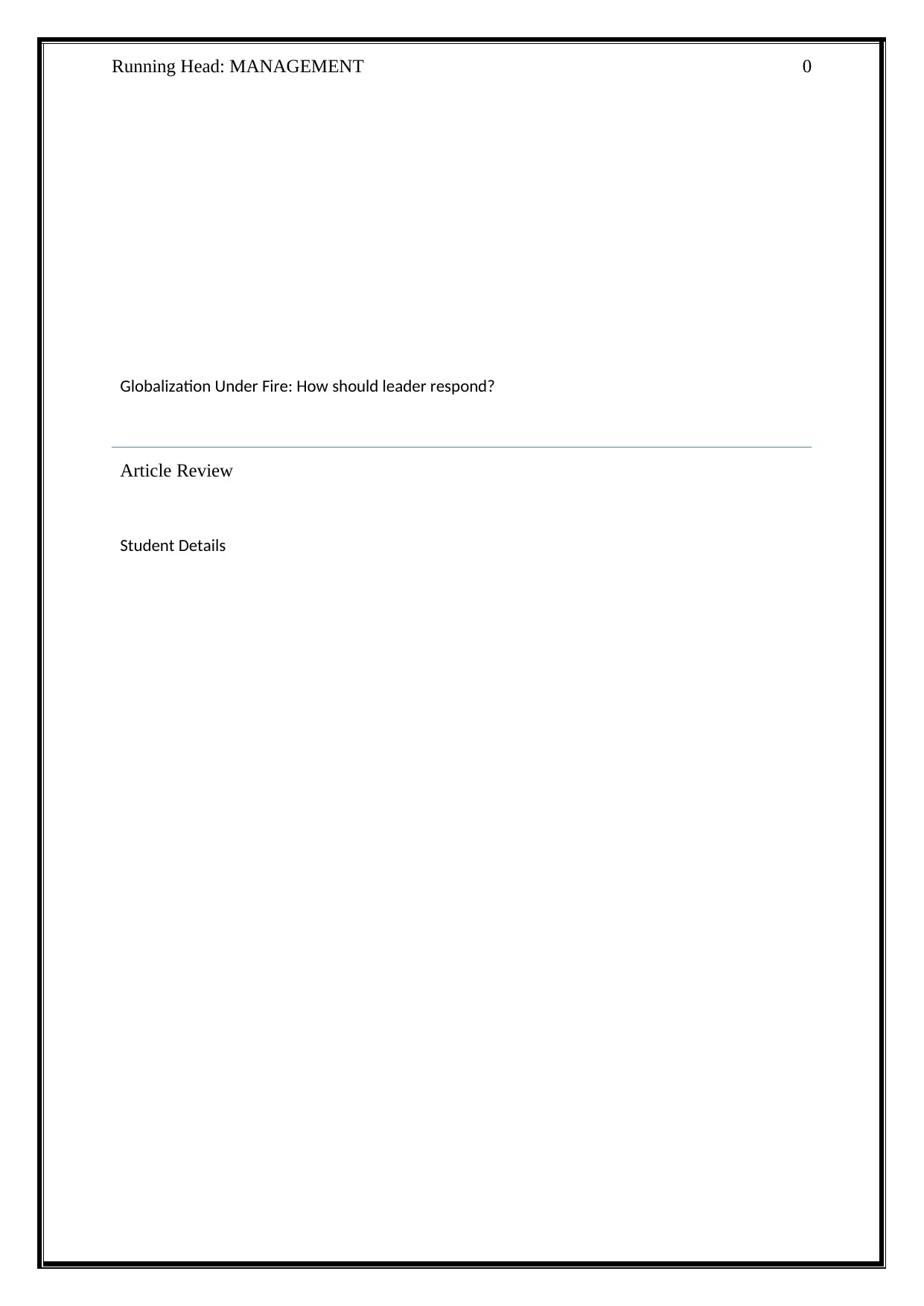
Running Head: MANAGEMENT 0
Globalization Under Fire: How should leader respond?
Article Review
Student Details
Globalization Under Fire: How should leader respond?
Article Review
Student Details
Paraphrase This Document
Need a fresh take? Get an instant paraphrase of this document with our AI Paraphraser
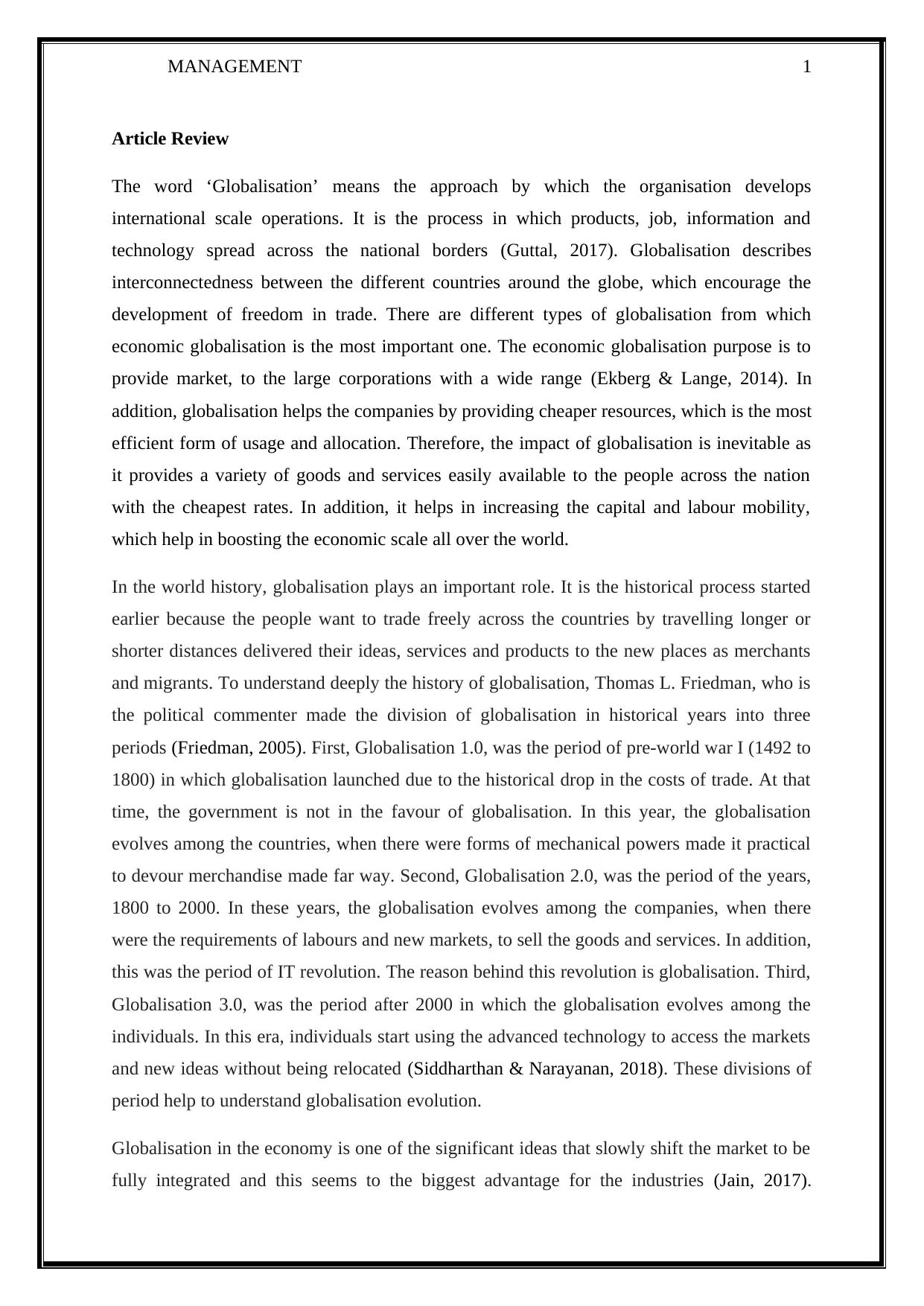
MANAGEMENT 1
Article Review
The word ‘Globalisation’ means the approach by which the organisation develops
international scale operations. It is the process in which products, job, information and
technology spread across the national borders (Guttal, 2017). Globalisation describes
interconnectedness between the different countries around the globe, which encourage the
development of freedom in trade. There are different types of globalisation from which
economic globalisation is the most important one. The economic globalisation purpose is to
provide market, to the large corporations with a wide range (Ekberg & Lange, 2014). In
addition, globalisation helps the companies by providing cheaper resources, which is the most
efficient form of usage and allocation. Therefore, the impact of globalisation is inevitable as
it provides a variety of goods and services easily available to the people across the nation
with the cheapest rates. In addition, it helps in increasing the capital and labour mobility,
which help in boosting the economic scale all over the world.
In the world history, globalisation plays an important role. It is the historical process started
earlier because the people want to trade freely across the countries by travelling longer or
shorter distances delivered their ideas, services and products to the new places as merchants
and migrants. To understand deeply the history of globalisation, Thomas L. Friedman, who is
the political commenter made the division of globalisation in historical years into three
periods (Friedman, 2005). First, Globalisation 1.0, was the period of pre-world war I (1492 to
1800) in which globalisation launched due to the historical drop in the costs of trade. At that
time, the government is not in the favour of globalisation. In this year, the globalisation
evolves among the countries, when there were forms of mechanical powers made it practical
to devour merchandise made far way. Second, Globalisation 2.0, was the period of the years,
1800 to 2000. In these years, the globalisation evolves among the companies, when there
were the requirements of labours and new markets, to sell the goods and services. In addition,
this was the period of IT revolution. The reason behind this revolution is globalisation. Third,
Globalisation 3.0, was the period after 2000 in which the globalisation evolves among the
individuals. In this era, individuals start using the advanced technology to access the markets
and new ideas without being relocated (Siddharthan & Narayanan, 2018). These divisions of
period help to understand globalisation evolution.
Globalisation in the economy is one of the significant ideas that slowly shift the market to be
fully integrated and this seems to the biggest advantage for the industries (Jain, 2017).
Article Review
The word ‘Globalisation’ means the approach by which the organisation develops
international scale operations. It is the process in which products, job, information and
technology spread across the national borders (Guttal, 2017). Globalisation describes
interconnectedness between the different countries around the globe, which encourage the
development of freedom in trade. There are different types of globalisation from which
economic globalisation is the most important one. The economic globalisation purpose is to
provide market, to the large corporations with a wide range (Ekberg & Lange, 2014). In
addition, globalisation helps the companies by providing cheaper resources, which is the most
efficient form of usage and allocation. Therefore, the impact of globalisation is inevitable as
it provides a variety of goods and services easily available to the people across the nation
with the cheapest rates. In addition, it helps in increasing the capital and labour mobility,
which help in boosting the economic scale all over the world.
In the world history, globalisation plays an important role. It is the historical process started
earlier because the people want to trade freely across the countries by travelling longer or
shorter distances delivered their ideas, services and products to the new places as merchants
and migrants. To understand deeply the history of globalisation, Thomas L. Friedman, who is
the political commenter made the division of globalisation in historical years into three
periods (Friedman, 2005). First, Globalisation 1.0, was the period of pre-world war I (1492 to
1800) in which globalisation launched due to the historical drop in the costs of trade. At that
time, the government is not in the favour of globalisation. In this year, the globalisation
evolves among the countries, when there were forms of mechanical powers made it practical
to devour merchandise made far way. Second, Globalisation 2.0, was the period of the years,
1800 to 2000. In these years, the globalisation evolves among the companies, when there
were the requirements of labours and new markets, to sell the goods and services. In addition,
this was the period of IT revolution. The reason behind this revolution is globalisation. Third,
Globalisation 3.0, was the period after 2000 in which the globalisation evolves among the
individuals. In this era, individuals start using the advanced technology to access the markets
and new ideas without being relocated (Siddharthan & Narayanan, 2018). These divisions of
period help to understand globalisation evolution.
Globalisation in the economy is one of the significant ideas that slowly shift the market to be
fully integrated and this seems to the biggest advantage for the industries (Jain, 2017).
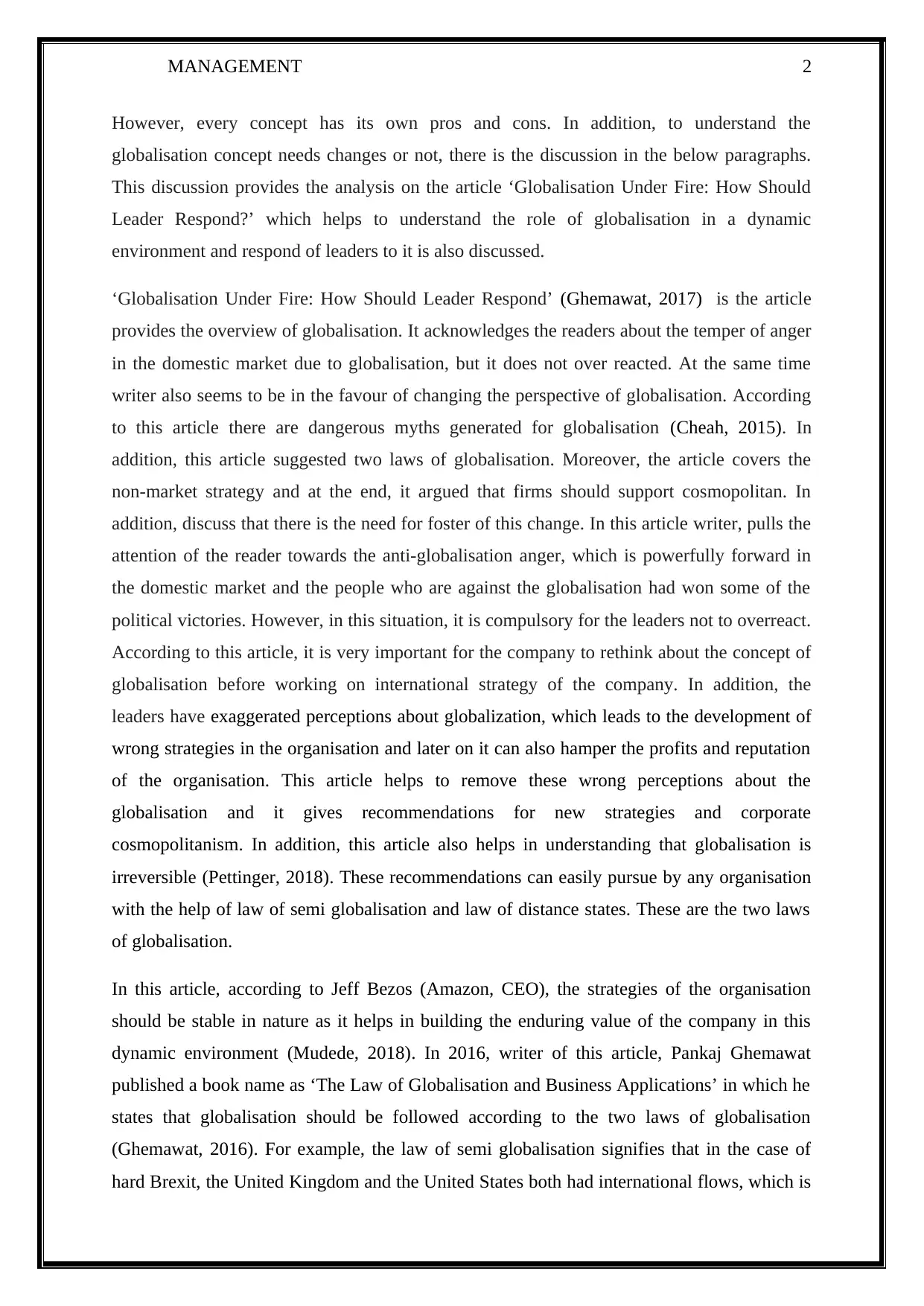
MANAGEMENT 2
However, every concept has its own pros and cons. In addition, to understand the
globalisation concept needs changes or not, there is the discussion in the below paragraphs.
This discussion provides the analysis on the article ‘Globalisation Under Fire: How Should
Leader Respond?’ which helps to understand the role of globalisation in a dynamic
environment and respond of leaders to it is also discussed.
‘Globalisation Under Fire: How Should Leader Respond’ (Ghemawat, 2017) is the article
provides the overview of globalisation. It acknowledges the readers about the temper of anger
in the domestic market due to globalisation, but it does not over reacted. At the same time
writer also seems to be in the favour of changing the perspective of globalisation. According
to this article there are dangerous myths generated for globalisation (Cheah, 2015). In
addition, this article suggested two laws of globalisation. Moreover, the article covers the
non-market strategy and at the end, it argued that firms should support cosmopolitan. In
addition, discuss that there is the need for foster of this change. In this article writer, pulls the
attention of the reader towards the anti-globalisation anger, which is powerfully forward in
the domestic market and the people who are against the globalisation had won some of the
political victories. However, in this situation, it is compulsory for the leaders not to overreact.
According to this article, it is very important for the company to rethink about the concept of
globalisation before working on international strategy of the company. In addition, the
leaders have exaggerated perceptions about globalization, which leads to the development of
wrong strategies in the organisation and later on it can also hamper the profits and reputation
of the organisation. This article helps to remove these wrong perceptions about the
globalisation and it gives recommendations for new strategies and corporate
cosmopolitanism. In addition, this article also helps in understanding that globalisation is
irreversible (Pettinger, 2018). These recommendations can easily pursue by any organisation
with the help of law of semi globalisation and law of distance states. These are the two laws
of globalisation.
In this article, according to Jeff Bezos (Amazon, CEO), the strategies of the organisation
should be stable in nature as it helps in building the enduring value of the company in this
dynamic environment (Mudede, 2018). In 2016, writer of this article, Pankaj Ghemawat
published a book name as ‘The Law of Globalisation and Business Applications’ in which he
states that globalisation should be followed according to the two laws of globalisation
(Ghemawat, 2016). For example, the law of semi globalisation signifies that in the case of
hard Brexit, the United Kingdom and the United States both had international flows, which is
However, every concept has its own pros and cons. In addition, to understand the
globalisation concept needs changes or not, there is the discussion in the below paragraphs.
This discussion provides the analysis on the article ‘Globalisation Under Fire: How Should
Leader Respond?’ which helps to understand the role of globalisation in a dynamic
environment and respond of leaders to it is also discussed.
‘Globalisation Under Fire: How Should Leader Respond’ (Ghemawat, 2017) is the article
provides the overview of globalisation. It acknowledges the readers about the temper of anger
in the domestic market due to globalisation, but it does not over reacted. At the same time
writer also seems to be in the favour of changing the perspective of globalisation. According
to this article there are dangerous myths generated for globalisation (Cheah, 2015). In
addition, this article suggested two laws of globalisation. Moreover, the article covers the
non-market strategy and at the end, it argued that firms should support cosmopolitan. In
addition, discuss that there is the need for foster of this change. In this article writer, pulls the
attention of the reader towards the anti-globalisation anger, which is powerfully forward in
the domestic market and the people who are against the globalisation had won some of the
political victories. However, in this situation, it is compulsory for the leaders not to overreact.
According to this article, it is very important for the company to rethink about the concept of
globalisation before working on international strategy of the company. In addition, the
leaders have exaggerated perceptions about globalization, which leads to the development of
wrong strategies in the organisation and later on it can also hamper the profits and reputation
of the organisation. This article helps to remove these wrong perceptions about the
globalisation and it gives recommendations for new strategies and corporate
cosmopolitanism. In addition, this article also helps in understanding that globalisation is
irreversible (Pettinger, 2018). These recommendations can easily pursue by any organisation
with the help of law of semi globalisation and law of distance states. These are the two laws
of globalisation.
In this article, according to Jeff Bezos (Amazon, CEO), the strategies of the organisation
should be stable in nature as it helps in building the enduring value of the company in this
dynamic environment (Mudede, 2018). In 2016, writer of this article, Pankaj Ghemawat
published a book name as ‘The Law of Globalisation and Business Applications’ in which he
states that globalisation should be followed according to the two laws of globalisation
(Ghemawat, 2016). For example, the law of semi globalisation signifies that in the case of
hard Brexit, the United Kingdom and the United States both had international flows, which is
⊘ This is a preview!⊘
Do you want full access?
Subscribe today to unlock all pages.

Trusted by 1+ million students worldwide
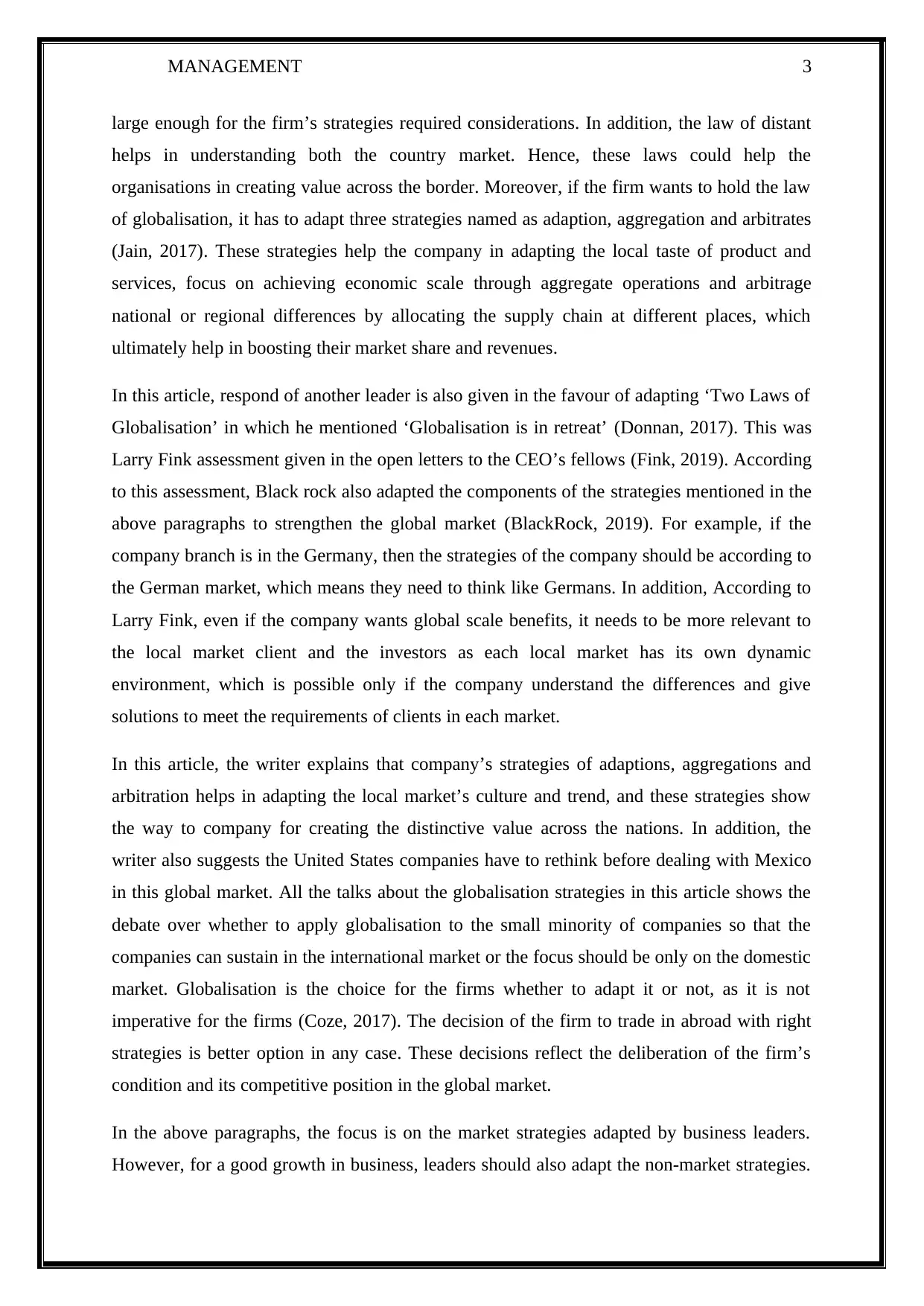
MANAGEMENT 3
large enough for the firm’s strategies required considerations. In addition, the law of distant
helps in understanding both the country market. Hence, these laws could help the
organisations in creating value across the border. Moreover, if the firm wants to hold the law
of globalisation, it has to adapt three strategies named as adaption, aggregation and arbitrates
(Jain, 2017). These strategies help the company in adapting the local taste of product and
services, focus on achieving economic scale through aggregate operations and arbitrage
national or regional differences by allocating the supply chain at different places, which
ultimately help in boosting their market share and revenues.
In this article, respond of another leader is also given in the favour of adapting ‘Two Laws of
Globalisation’ in which he mentioned ‘Globalisation is in retreat’ (Donnan, 2017). This was
Larry Fink assessment given in the open letters to the CEO’s fellows (Fink, 2019). According
to this assessment, Black rock also adapted the components of the strategies mentioned in the
above paragraphs to strengthen the global market (BlackRock, 2019). For example, if the
company branch is in the Germany, then the strategies of the company should be according to
the German market, which means they need to think like Germans. In addition, According to
Larry Fink, even if the company wants global scale benefits, it needs to be more relevant to
the local market client and the investors as each local market has its own dynamic
environment, which is possible only if the company understand the differences and give
solutions to meet the requirements of clients in each market.
In this article, the writer explains that company’s strategies of adaptions, aggregations and
arbitration helps in adapting the local market’s culture and trend, and these strategies show
the way to company for creating the distinctive value across the nations. In addition, the
writer also suggests the United States companies have to rethink before dealing with Mexico
in this global market. All the talks about the globalisation strategies in this article shows the
debate over whether to apply globalisation to the small minority of companies so that the
companies can sustain in the international market or the focus should be only on the domestic
market. Globalisation is the choice for the firms whether to adapt it or not, as it is not
imperative for the firms (Coze, 2017). The decision of the firm to trade in abroad with right
strategies is better option in any case. These decisions reflect the deliberation of the firm’s
condition and its competitive position in the global market.
In the above paragraphs, the focus is on the market strategies adapted by business leaders.
However, for a good growth in business, leaders should also adapt the non-market strategies.
large enough for the firm’s strategies required considerations. In addition, the law of distant
helps in understanding both the country market. Hence, these laws could help the
organisations in creating value across the border. Moreover, if the firm wants to hold the law
of globalisation, it has to adapt three strategies named as adaption, aggregation and arbitrates
(Jain, 2017). These strategies help the company in adapting the local taste of product and
services, focus on achieving economic scale through aggregate operations and arbitrage
national or regional differences by allocating the supply chain at different places, which
ultimately help in boosting their market share and revenues.
In this article, respond of another leader is also given in the favour of adapting ‘Two Laws of
Globalisation’ in which he mentioned ‘Globalisation is in retreat’ (Donnan, 2017). This was
Larry Fink assessment given in the open letters to the CEO’s fellows (Fink, 2019). According
to this assessment, Black rock also adapted the components of the strategies mentioned in the
above paragraphs to strengthen the global market (BlackRock, 2019). For example, if the
company branch is in the Germany, then the strategies of the company should be according to
the German market, which means they need to think like Germans. In addition, According to
Larry Fink, even if the company wants global scale benefits, it needs to be more relevant to
the local market client and the investors as each local market has its own dynamic
environment, which is possible only if the company understand the differences and give
solutions to meet the requirements of clients in each market.
In this article, the writer explains that company’s strategies of adaptions, aggregations and
arbitration helps in adapting the local market’s culture and trend, and these strategies show
the way to company for creating the distinctive value across the nations. In addition, the
writer also suggests the United States companies have to rethink before dealing with Mexico
in this global market. All the talks about the globalisation strategies in this article shows the
debate over whether to apply globalisation to the small minority of companies so that the
companies can sustain in the international market or the focus should be only on the domestic
market. Globalisation is the choice for the firms whether to adapt it or not, as it is not
imperative for the firms (Coze, 2017). The decision of the firm to trade in abroad with right
strategies is better option in any case. These decisions reflect the deliberation of the firm’s
condition and its competitive position in the global market.
In the above paragraphs, the focus is on the market strategies adapted by business leaders.
However, for a good growth in business, leaders should also adapt the non-market strategies.
Paraphrase This Document
Need a fresh take? Get an instant paraphrase of this document with our AI Paraphraser
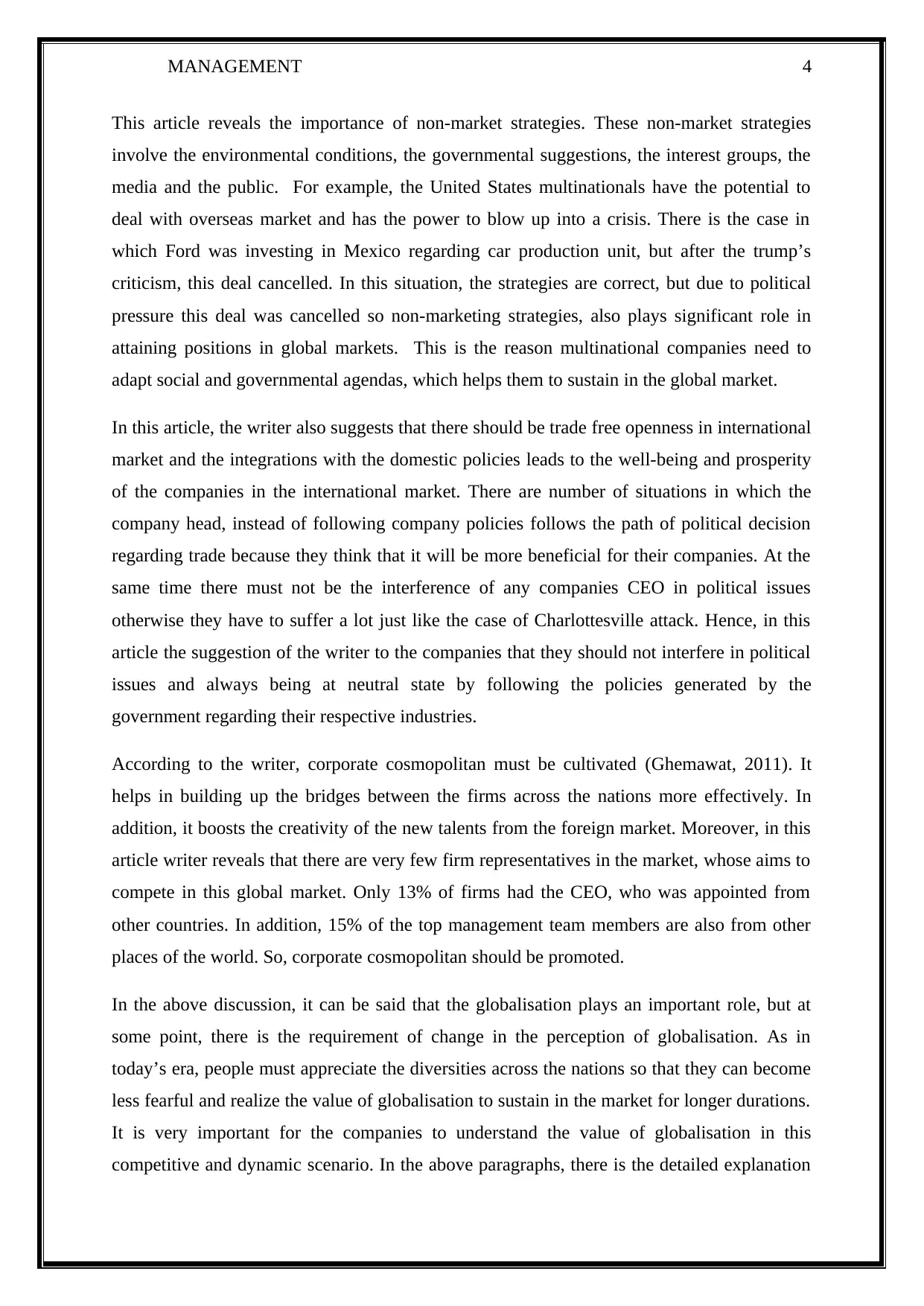
MANAGEMENT 4
This article reveals the importance of non-market strategies. These non-market strategies
involve the environmental conditions, the governmental suggestions, the interest groups, the
media and the public. For example, the United States multinationals have the potential to
deal with overseas market and has the power to blow up into a crisis. There is the case in
which Ford was investing in Mexico regarding car production unit, but after the trump’s
criticism, this deal cancelled. In this situation, the strategies are correct, but due to political
pressure this deal was cancelled so non-marketing strategies, also plays significant role in
attaining positions in global markets. This is the reason multinational companies need to
adapt social and governmental agendas, which helps them to sustain in the global market.
In this article, the writer also suggests that there should be trade free openness in international
market and the integrations with the domestic policies leads to the well-being and prosperity
of the companies in the international market. There are number of situations in which the
company head, instead of following company policies follows the path of political decision
regarding trade because they think that it will be more beneficial for their companies. At the
same time there must not be the interference of any companies CEO in political issues
otherwise they have to suffer a lot just like the case of Charlottesville attack. Hence, in this
article the suggestion of the writer to the companies that they should not interfere in political
issues and always being at neutral state by following the policies generated by the
government regarding their respective industries.
According to the writer, corporate cosmopolitan must be cultivated (Ghemawat, 2011). It
helps in building up the bridges between the firms across the nations more effectively. In
addition, it boosts the creativity of the new talents from the foreign market. Moreover, in this
article writer reveals that there are very few firm representatives in the market, whose aims to
compete in this global market. Only 13% of firms had the CEO, who was appointed from
other countries. In addition, 15% of the top management team members are also from other
places of the world. So, corporate cosmopolitan should be promoted.
In the above discussion, it can be said that the globalisation plays an important role, but at
some point, there is the requirement of change in the perception of globalisation. As in
today’s era, people must appreciate the diversities across the nations so that they can become
less fearful and realize the value of globalisation to sustain in the market for longer durations.
It is very important for the companies to understand the value of globalisation in this
competitive and dynamic scenario. In the above paragraphs, there is the detailed explanation
This article reveals the importance of non-market strategies. These non-market strategies
involve the environmental conditions, the governmental suggestions, the interest groups, the
media and the public. For example, the United States multinationals have the potential to
deal with overseas market and has the power to blow up into a crisis. There is the case in
which Ford was investing in Mexico regarding car production unit, but after the trump’s
criticism, this deal cancelled. In this situation, the strategies are correct, but due to political
pressure this deal was cancelled so non-marketing strategies, also plays significant role in
attaining positions in global markets. This is the reason multinational companies need to
adapt social and governmental agendas, which helps them to sustain in the global market.
In this article, the writer also suggests that there should be trade free openness in international
market and the integrations with the domestic policies leads to the well-being and prosperity
of the companies in the international market. There are number of situations in which the
company head, instead of following company policies follows the path of political decision
regarding trade because they think that it will be more beneficial for their companies. At the
same time there must not be the interference of any companies CEO in political issues
otherwise they have to suffer a lot just like the case of Charlottesville attack. Hence, in this
article the suggestion of the writer to the companies that they should not interfere in political
issues and always being at neutral state by following the policies generated by the
government regarding their respective industries.
According to the writer, corporate cosmopolitan must be cultivated (Ghemawat, 2011). It
helps in building up the bridges between the firms across the nations more effectively. In
addition, it boosts the creativity of the new talents from the foreign market. Moreover, in this
article writer reveals that there are very few firm representatives in the market, whose aims to
compete in this global market. Only 13% of firms had the CEO, who was appointed from
other countries. In addition, 15% of the top management team members are also from other
places of the world. So, corporate cosmopolitan should be promoted.
In the above discussion, it can be said that the globalisation plays an important role, but at
some point, there is the requirement of change in the perception of globalisation. As in
today’s era, people must appreciate the diversities across the nations so that they can become
less fearful and realize the value of globalisation to sustain in the market for longer durations.
It is very important for the companies to understand the value of globalisation in this
competitive and dynamic scenario. In the above paragraphs, there is the detailed explanation
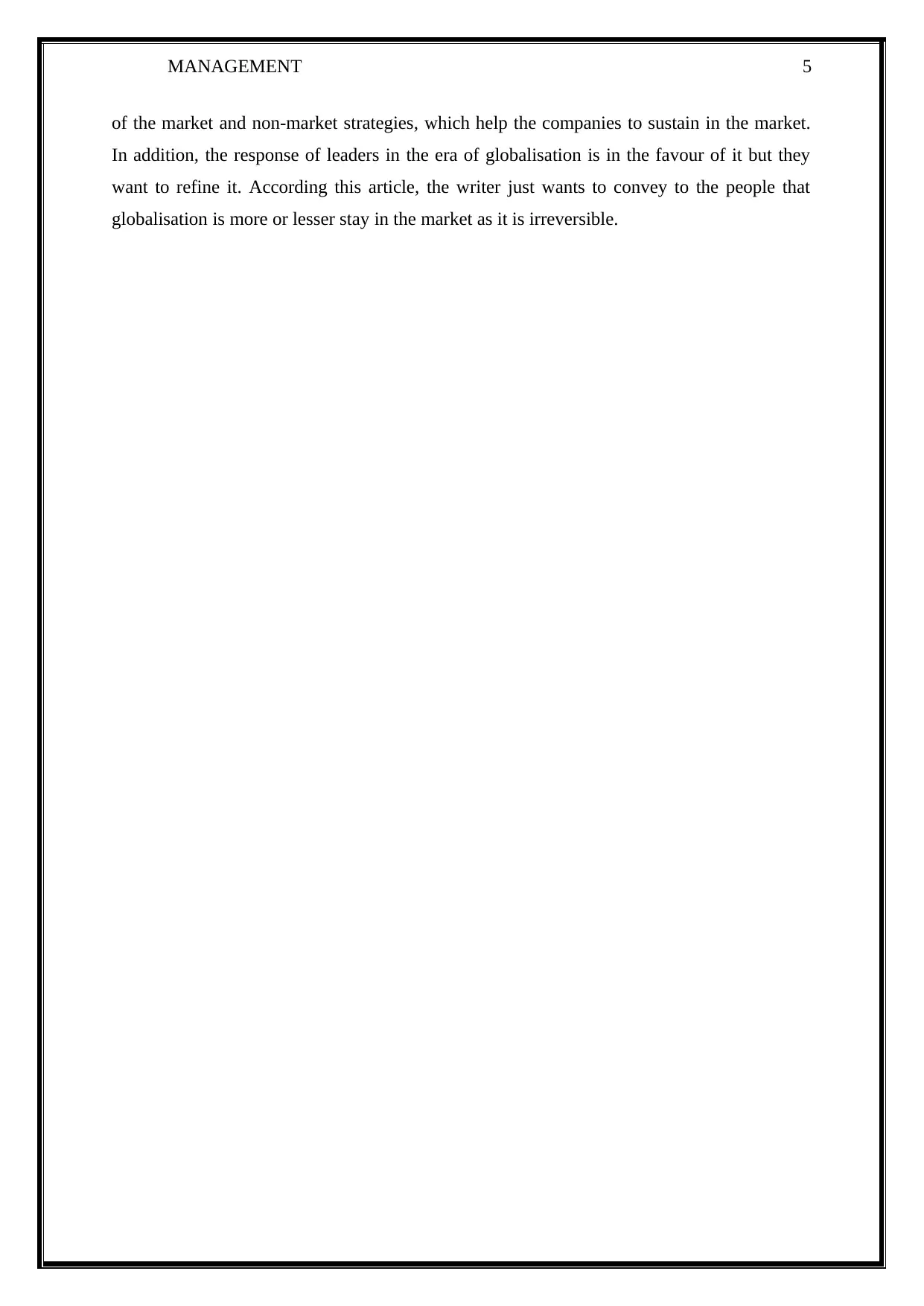
MANAGEMENT 5
of the market and non-market strategies, which help the companies to sustain in the market.
In addition, the response of leaders in the era of globalisation is in the favour of it but they
want to refine it. According this article, the writer just wants to convey to the people that
globalisation is more or lesser stay in the market as it is irreversible.
of the market and non-market strategies, which help the companies to sustain in the market.
In addition, the response of leaders in the era of globalisation is in the favour of it but they
want to refine it. According this article, the writer just wants to convey to the people that
globalisation is more or lesser stay in the market as it is irreversible.
⊘ This is a preview!⊘
Do you want full access?
Subscribe today to unlock all pages.

Trusted by 1+ million students worldwide
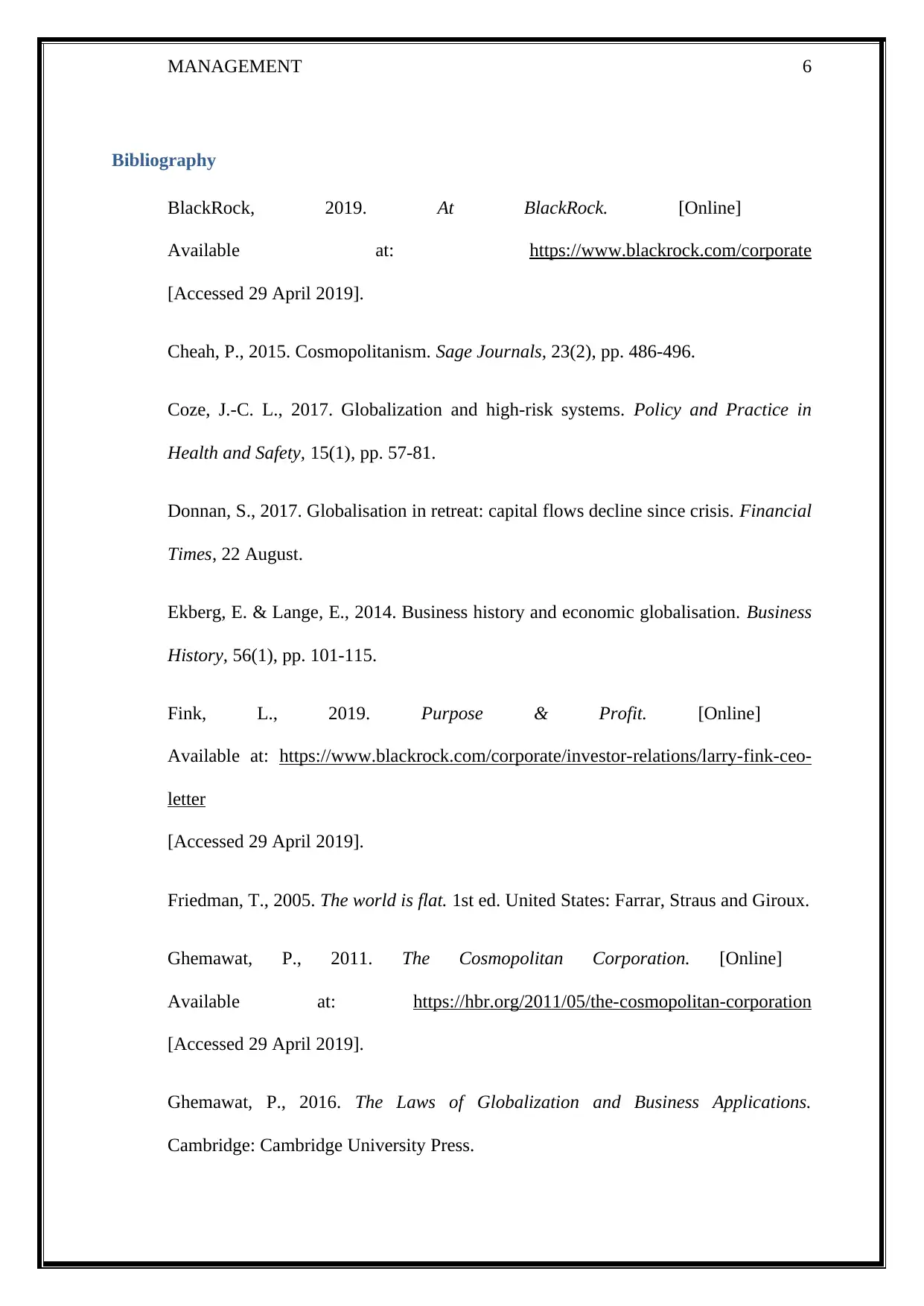
MANAGEMENT 6
Bibliography
BlackRock, 2019. At BlackRock. [Online]
Available at: https://www.blackrock.com/corporate
[Accessed 29 April 2019].
Cheah, P., 2015. Cosmopolitanism. Sage Journals, 23(2), pp. 486-496.
Coze, J.-C. L., 2017. Globalization and high-risk systems. Policy and Practice in
Health and Safety, 15(1), pp. 57-81.
Donnan, S., 2017. Globalisation in retreat: capital flows decline since crisis. Financial
Times, 22 August.
Ekberg, E. & Lange, E., 2014. Business history and economic globalisation. Business
History, 56(1), pp. 101-115.
Fink, L., 2019. Purpose & Profit. [Online]
Available at: https://www.blackrock.com/corporate/investor-relations/larry-fink-ceo-
letter
[Accessed 29 April 2019].
Friedman, T., 2005. The world is flat. 1st ed. United States: Farrar, Straus and Giroux.
Ghemawat, P., 2011. The Cosmopolitan Corporation. [Online]
Available at: https://hbr.org/2011/05/the-cosmopolitan-corporation
[Accessed 29 April 2019].
Ghemawat, P., 2016. The Laws of Globalization and Business Applications.
Cambridge: Cambridge University Press.
Bibliography
BlackRock, 2019. At BlackRock. [Online]
Available at: https://www.blackrock.com/corporate
[Accessed 29 April 2019].
Cheah, P., 2015. Cosmopolitanism. Sage Journals, 23(2), pp. 486-496.
Coze, J.-C. L., 2017. Globalization and high-risk systems. Policy and Practice in
Health and Safety, 15(1), pp. 57-81.
Donnan, S., 2017. Globalisation in retreat: capital flows decline since crisis. Financial
Times, 22 August.
Ekberg, E. & Lange, E., 2014. Business history and economic globalisation. Business
History, 56(1), pp. 101-115.
Fink, L., 2019. Purpose & Profit. [Online]
Available at: https://www.blackrock.com/corporate/investor-relations/larry-fink-ceo-
letter
[Accessed 29 April 2019].
Friedman, T., 2005. The world is flat. 1st ed. United States: Farrar, Straus and Giroux.
Ghemawat, P., 2011. The Cosmopolitan Corporation. [Online]
Available at: https://hbr.org/2011/05/the-cosmopolitan-corporation
[Accessed 29 April 2019].
Ghemawat, P., 2016. The Laws of Globalization and Business Applications.
Cambridge: Cambridge University Press.
Paraphrase This Document
Need a fresh take? Get an instant paraphrase of this document with our AI Paraphraser
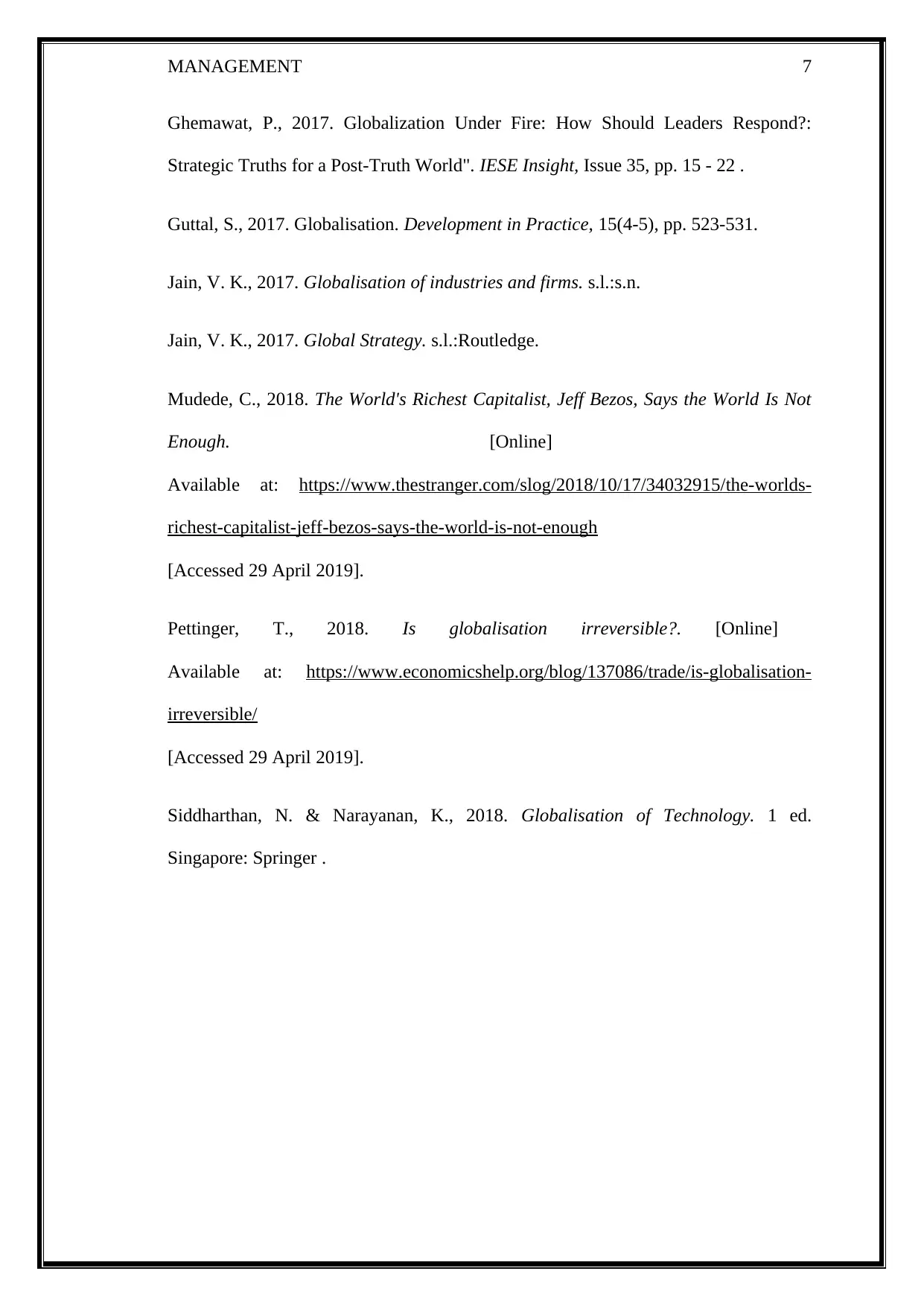
MANAGEMENT 7
Ghemawat, P., 2017. Globalization Under Fire: How Should Leaders Respond?:
Strategic Truths for a Post-Truth World". IESE Insight, Issue 35, pp. 15 - 22 .
Guttal, S., 2017. Globalisation. Development in Practice, 15(4-5), pp. 523-531.
Jain, V. K., 2017. Globalisation of industries and firms. s.l.:s.n.
Jain, V. K., 2017. Global Strategy. s.l.:Routledge.
Mudede, C., 2018. The World's Richest Capitalist, Jeff Bezos, Says the World Is Not
Enough. [Online]
Available at: https://www.thestranger.com/slog/2018/10/17/34032915/the-worlds-
richest-capitalist-jeff-bezos-says-the-world-is-not-enough
[Accessed 29 April 2019].
Pettinger, T., 2018. Is globalisation irreversible?. [Online]
Available at: https://www.economicshelp.org/blog/137086/trade/is-globalisation-
irreversible/
[Accessed 29 April 2019].
Siddharthan, N. & Narayanan, K., 2018. Globalisation of Technology. 1 ed.
Singapore: Springer .
Ghemawat, P., 2017. Globalization Under Fire: How Should Leaders Respond?:
Strategic Truths for a Post-Truth World". IESE Insight, Issue 35, pp. 15 - 22 .
Guttal, S., 2017. Globalisation. Development in Practice, 15(4-5), pp. 523-531.
Jain, V. K., 2017. Globalisation of industries and firms. s.l.:s.n.
Jain, V. K., 2017. Global Strategy. s.l.:Routledge.
Mudede, C., 2018. The World's Richest Capitalist, Jeff Bezos, Says the World Is Not
Enough. [Online]
Available at: https://www.thestranger.com/slog/2018/10/17/34032915/the-worlds-
richest-capitalist-jeff-bezos-says-the-world-is-not-enough
[Accessed 29 April 2019].
Pettinger, T., 2018. Is globalisation irreversible?. [Online]
Available at: https://www.economicshelp.org/blog/137086/trade/is-globalisation-
irreversible/
[Accessed 29 April 2019].
Siddharthan, N. & Narayanan, K., 2018. Globalisation of Technology. 1 ed.
Singapore: Springer .
1 out of 8
Related Documents
Your All-in-One AI-Powered Toolkit for Academic Success.
+13062052269
info@desklib.com
Available 24*7 on WhatsApp / Email
![[object Object]](/_next/static/media/star-bottom.7253800d.svg)
Unlock your academic potential
Copyright © 2020–2026 A2Z Services. All Rights Reserved. Developed and managed by ZUCOL.





